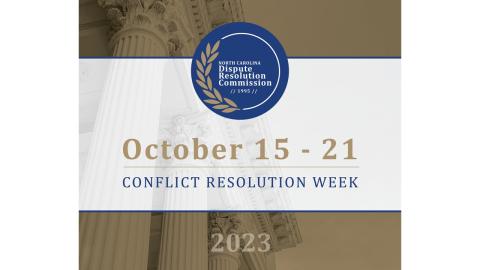Chief Justice Paul Newby Declares Third Week of October 2023 as Conflict Resolution Week
Article contents

Chief Justice Paul Newby has issued a proclamation declaring the third week of October (October 15-21) as Conflict Resolution Week for the North Carolina Judicial Branch. Conflict Resolution Week is intended to recognize the importance of dispute resolution to the Judicial Branch and to North Carolinians. Mediators address a wide variety of disputes, including misdemeanor criminal matters, child custody and visitation, equitable distribution, estates, guardianships, automobile accidents, business and contract matters and many others.
”Conflicts are often an unavoidable process of life,” said Chief Justice Newby. “What is important, however, is how we resolve those conflicts. I'm proud that North Carolina has developed programs which promote dispute resolution in our courts. These programs exemplify our state's dedication to fostering harmony, finding common ground, and resolving conflicts with fairness and efficiency to ensure that justice is administered without favor, denial, or delay.”
Various alternative dispute resolution (ADR) programs will celebrate Conflict Resolution Day by hosting educational programs for those trained in ADR services. The North Carolina Dispute Resolution Commission (NCDRC) will host a live, in-person event on Thursday, October 19 at the North Carolina Judicial Center to provide 4.25 hours of continuing legal education (CLE) classes, including 2 hours of continuing mediation education (CME), related to dispute resolution.
Those who wish to participate can email [email protected] to register.
The North Carolina Administrative Office of the Courts (NCAOC) Child Custody and Visitation Mediation Program will also be hosting a training event to for all child custody mediators across the state.
ABOUT DISPUTE RESOLUTION
North Carolina has long had a strong commitment to programs that promote dispute resolution. The North Carolina General Assembly (NCGA) created mediation and arbitration programs that have successfully operated in North Carolina’s district and superior courts for more than 25 years.
In 1989, the NCGA passed legislation (NCGS § 50-13.1) to implement a statewide Child Custody and Visitation Mediation Program under the guidance of an Advisory Committee appointed by the director of the North Carolina Administrative Office of the Courts (NCAOC). Today, North Carolina is one of a few states in the country that has judicial districts that provide mandatory custody mediation for all 100 counties statewide.
The Dispute Resolution Section of the NCBA was established in 1993 for the purpose of serving as a resource for developing and implementing Alternative Dispute Resolution (ADR) programs and techniques in the legal system and society at large.
The North Carolina Dispute Resolution Commission, established in October 1995, is charged with certifying and regulating private mediators who serve the courts in five mediation programs established by the NCGA. The Commission recommends policy, rules, and rule revisions relating to dispute resolution in North Carolina courts. The 18-member Commission includes members appointed by all three branches of government.
Thousands of disputes between individuals, family members, corporations, small businesses, governmental agencies, and others are brought before North Carolina civil and criminal courts each year. Mediation, arbitration, and other conflict resolution processes such as collaborative law, neutral evaluation, and restorative justice can help reduce the demands on the trial courts and improve efficiency. Many disputes are effectively addressed and resolved by the parties themselves with the help of a trained mediator or arbitrator, without the need to involve the police or the court system.
MORE INFORMATION
The NCDRC reports that of cases mediated in FY 2022-23, more than 60 percent of civil superior court cases and more than 71 percent of family financial cases were settled.
The Court-Ordered Arbitration Program reports on average a 19 percent appeals rate for arbitrated matters. The arbitration program also encourages early settlement of cases reflecting approximately 45 percent of cases noticed for arbitration are resolved prior to the arbitration hearing.
In FY 2022-23, the Child Custody and Visitation Mediation Program reports that more than 17,000 people attended orientation to learn about mediation. Additionally, there were 9,312 mediation sessions and almost 4,000 Parenting Agreements were drafted.
HELPFUL LINKS
- Conflict Resolution Week 2023 Proclamation
- DRC Conflict Resolution Day agenda
- Community mediation centers certified by the NCDRC to conduct district criminal court mediations in North Carolina (by region)
- PODCAST: All Things Judicial Highlights the North Carolina Dispute Resolution Commission